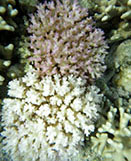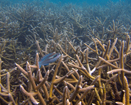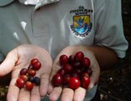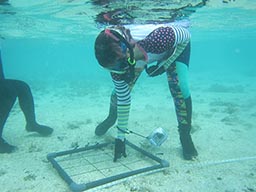- ABOUT US
- PROGRAM AREAS
- CONSERVATION APPROACH
- EDUCATION
- MULTIMEDIA
2015 Featured Stories
November

Protecting American Samoa's Coral Reefs One Rain Garden at a Time
American Samoa is home to diverse and beautiful coral reef ecosystems. On the island of Tutuila, the Faga'alu watershed is a priority site identified by local resource managers and is the focus of NOAA and U.S. Coral reef Task Force efforts to reduce the impacts of land-based sources of pollution to the region's coral reefs. More....
October

Scientists declare 3rd global coral bleaching event on record
Bleaching intensifies in Hawaii, high ocean temperatures threaten Caribbean.
July

Webinar announcement: Get the latest on the 2015 coral bleaching event, preparation, and response
When: July 28, 2015 at 3:00 PM EDT
Who: Coral reef resource managers

Coral Bleaching Threat Increasing in Western Atlantic and Pacific Oceans
As unusually warm ocean temperatures cover the north Pacific, equatorial Pacific, and western Atlantic oceans, NOAA scientists expect greater bleaching of corals on Northern Hemisphere reefs through October, potentially leading to the death of corals over a wide area and affecting the long-term supply of fish and shellfish. The news comes from the latest NOAA's Coral Reef Watch four-month Coral Bleaching outlook, which is updated weekly. More....

Oceans under Pressure from Climate Change this Century
Scientists with the Oceans 2015 Initiative contrasted the threats that two potential carbon dioxide emission pathways pose to marine ecosystems and the goods and services they provide. Their findings are reported in a paper titled "Contrasting Futures for Ocean and Society from Different Anthropogenic CO2 Emissions Scenarios" published in the July 3, 2015 issue of the journal Science. More....
June

Announcing the 2015 National Coral Reef Management Fellowship Program
The next generation of coral reef managers can get hands-on training to prepare them for successful careers through the National Coral Reef Management Fellowship Program. More....

Tracking the Marine Aquarium Trade
Home aquariums are a popular hobby, but until now there was no way of knowing exactly how many marine fish and invertebrates are imported to the U.S. Researchers from Roger Williams University and the New England Aquarium developed an interactive web tool to illuminate and evaluate the global shipping pathways of the aquarium trade. More....
May

The Coral Reefs of Palau: Nature's Amazing Underwater Cities?
Join The Nature Conservancy on a Virtual Field Trip to the Coral Reefs of Palau: amazing underwater cities found near a remote network of islands, deep in the Pacific Ocean.
More....

American Samoa's Thorny Issue
Scientists in American Samoa are tacking an outbreak of crown-of-thorns starfish (Acanthaster planci), known locally as alamea, which live on the archipelago's reefs and feed off of live stony corals. More....

Climate, reefs, and resilience
Watch as Britt Parker, NOAA Coral Reef Conservation Program's climate coordinator, explains why climate change is the biggest global threat coral reefs face today.
More....

Healthy + Resilient Coral Reefs = Healthy + Resilient Coasts
The coral reefs that lie just offshore of many of our coasts are more than things of wonder and beauty. These resources are inextricably linked to coastal community safety and protection. More....

Climate, reefs and resilience Q&A
Managers, scientists, and communities are working at a local scale to give their coral reefs a fighting chance in the face of a changing climate. In this online Q&A, Britt Parker, NOAA Coral Reef Conservation Program's climate coordinator,shares how applying resilience-based management techniques to reefs and reducing local stressors is helping reefs recover from global-scale climate events. More....

Partnering for Reef Resilience
The Reef Resilience Program is a decade-long partnership effort lead by The Nature Conservancy that builds the capacity of reef managers around the world to better address climate change impacts and other stressors to reefs. Check out these stories of successful resilience-based coral reef management from around the U.S. and its territories. More....

Assessing Reef Resilience in the Northern Mariana Islands
NOAA scientists in the Commonwealth of the Northern Marians Islands developed new and innovative techniques to help resource managers rank coral reef resilience.

Shade-grown coffee protects coral reefs in Puerto Rico
Coffee farmers in southwest Puerto Rico are working with scientists and resource managers to reduce agricultural runoff to nearby coral reefs by transitioning from sun-grown coffee to shade-grown coffee crops. More....

Coral Disease Under Climate Change
Scientists expect more coral disease as the climate continues to change, according to a paper recently published in the journal Nature Climate Change.
More....
March

Finding Fish Hotspots and Mapping Coral Reefs
From March 28-April 7, NOAA scientists will lead the 12th year of an expedition to map the sea floor habitats and identify fish populations in portions of the U.S. Virgin Islands, putting NOAA one step closer to developing comprehensive habitat maps for the territory. More....

Science to Support the Recovery of Threatened Corals
NOAA Fisheries recently released a roadmap to improve the status of two species of coral listed as threatened under the Endangered Species Act.
More....

Algal Bloom Affecting Guam's Manell-Geus Habitat Focus Area
Scientists and residents in Guam are tackling a serious algal bloom that is affecting local coral reefs, as well as the communities that depend on them.
More....
February

Finding Fish Hotspots and Mapping Coral Reefs
Last fall, warmer-than-average ocean temperatures resulted in a serious coral bleaching event in Hawaii. Marine resource managers and scientists immediately took to the water to monitor and document the effects of this phenomenon on local coral reef communities.More....

Science to Support the Recovery of Threatened Corals
NOAA scientists are warning that warm ocean temperatures in the equatorial Pacific and Indian Oceans could set the stage for major coral bleaching events across the globe in 2015.
More....

Coral Etiquette 101 : Make sure you enjoy coral areas responsibly by taking a few simple actions during your time in the water and on land.
Corals and other marine habitats are a must-see if you live in or are vising one of the many places in the U.S. that are home to these magnificent underwater resources. More....

Algal Bloom Affecting Guam's Manell-Geus Habitat Focus Area
Scientists and residents in Guam are tackling a serious algal bloom that is affecting local coral reefs, as well as the communities that depend on them.
More....
January

Building a BetterFish Trap : Scientists and U.S. Virgin Islands fishers partner to improve fish trap design
At first glance, an imposing wall of fish traps doesn't look like a coral reef conservation success story, but a closer look at a new trap design suggests a win-win for coral reefs and the fishers who depend on reef resources for food and income. More....

Puerto Rico is Home to NOAA's Caribbean Habitat Blueprint Focus Area
Puerto Rico's Northeast Reserves Marine Ecological Corridor and the Island of Culebra were recently named a NOAA Habitat Blueprint Focus Area. Habitat Focus Areas are places where NOAA, together with strong local partnerships, can increase the effectiveness of habitat conservation science and management efforts. More....
About Us

The NOAA Coral Reef Conservation Program was established in 2000 by the Coral Reef Conservation Act. Headquartered in Silver Spring, Maryland, the program is part of NOAA's Office for Coastal Management.

The Coral Reef Information System (CoRIS) is the program's information portal that provides access to NOAA coral reef data and products.
Work With US
U.S. Coral Reef Task Force
Funding Opportunities
Employment
Fellowship Program
Contracting Assistance
Graphic Identifier
Featured Stories Archive

Access the archive of featured stories here...
Feedback
Thank you for visiting NOAA’s Coral Reef Conservation Program online. Please take our website satisfaction survey. We welcome your ideas, comments, and feedback. Questions? Email coralreef@noaa.gov.
Stay Connected
Contact Us
NOAA’s Coral Reef Conservation Program
SSMC4, 10th Floor
1305 East West Highway
Silver Spring, MD 20910
coralreef@noaa.gov
